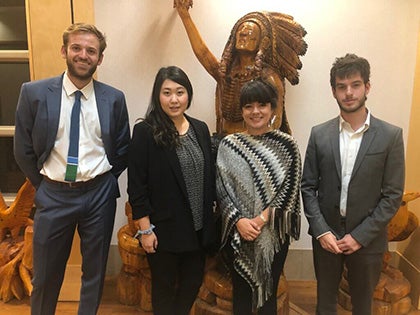Impact in Indian Country: How the Tribal Legal Development Clinic Serves Native Nations
UCLA Law Magazine | Fall 2020 | Volume 43

Thanks to a record $15 million gift from the Federated Indians of Graton Rancheria, UCLA School of Law’s Native Nations Law and Policy Center is poised to become a powerhouse destination in Indian law education. The transformative donation, which provides significant scholarship support for students interested in practicing tribal law, is but the latest highlight for a program whose impact extends to communities around California and the nation, most notably through the Tribal Legal Development Clinic (TLDC).
Created in 2019 with a $1.3 million, five-year grant from the San Manuel Band of Mission Indians, the TLDC is a truly synergetic partnership through clinical education. It provides UCLA Law students with significant real-world experience while they serve tribe members who lack resources in two key areas: tribal-code drafting and appellate legal practice.
“We help students think about what it would look like to write tribal code. How do you capture intent and a legislative understanding about how all the moving parts work together?” says UCLA Law Professor Angela Riley, who directs the Native Nations Law and Policy Center. “And because students are working with tribes, it is possible to do more fundamental constitution-drafting, the most visionary and basic documents of a governing system. I joke with my students that so many people come to law school to do constitutional law, but in our clinic, you can actually help draft constitutions.”
TLDC students also work as tribal-court judicial clerks, including with the Supreme Court of the Ho-Chunk Nation in Wisconsin. “It’s been a really positive partnership,” says Lauren van Schilfgaarde ’12, the San Manuel Band of Mission Indians Tribal Legal Development Clinic Director. “Tribal law students have to navigate what it means to use tribal law, what is binding versus persuasive. For example, the U.S. Supreme Court, which is otherwise binding for all other American courts, is not binding for a tribal court. You need to be sure about your source of the law.”
The benefits are mutual. “Students in our clinic offer a free legal service very much intended to bring a level of expertise and work that both instructors and the students have or are developing,” Riley says. “We can help tribes really with their institution-building and build their capacity in ways that they often wouldn’t be able to do without our support. Providing kind of those basic services to tribes is a benefit for them.”
Students in the Tribal Legal Development Clinic are also engaged in valuable policy work. This past year, clinic students developed a “Tribal Toolkit,” based on the United Nations Declaration on the Rights of Indigenous Peoples, that can be employed by tribal leaders to address indigenous and human rights in tribal law. TLDC students collaborated with the University of Colorado Law School and the Native American Rights Fund to develop the toolkit, which is designed to support the adoption of the Declaration’s principles, including the right of indigenous peoples to fully enjoy all human rights and fundamental freedoms recognized in the UN Charter, and the right to be free from any kind of discrimination. The toolkit is expected to be released in 2021 as a publicly available document.
Riley and van Schilfgaarde hope to endow the clinic beyond the five-year grant so that UCLA Law students can continue to learn while serving tribes in perpetuity. Certainly, there will continue to be an immense need for its work, says van Schilfgaarde, “We’re eager to ensure that tribes are able to build meaningful laws that are true to their community.”